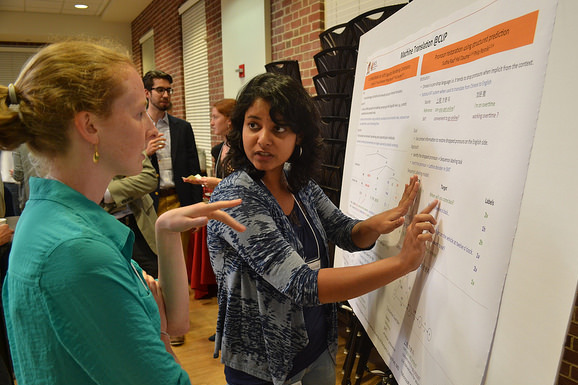5th Annual Language Science Day Highlights Many New Initiatives
October 24, 2014
Maryland Language Science Center

On September 19th the 5th annual Language Science Day (LSD) drew a crowd of 170 from throughout the University of Maryland. This year LSD marked the 1-year anniversary of the Maryland Language Science Center, and the event showcased the many ideas and initiatives that have been hatched over the past year, since the language science community went from being a guerrilla organization to an official university priority area. With a research community that spans 17 academic units in 6 colleges, even one as well-connected as ours, it isn’t easy to keep up with all that’s happening. LSD provides a great start-of-the-year opportunity to bring everybody up to speed. One tool for keeping everybody more connected is the new Language at Maryland website, which was launched at LSD. An LSC team worked closely with a team from the College of Arts & Humanities over the summer to build a new site that conveys the breadth of language science activities at the university, incorporating many dynamic features and opportunities for user-generated content. Another new web tool that saw the first light of day at LSD is Langscape , a portal for information about the world’s 7000 languages, accessed through a cool map interface. Tess Wood and Paul England explained that although the project is an unusual venture for LSC, it fits perfectly with LSC’s mission, because it aims to produce a better resource by pooling expertise across many fields, and because it has applications for research and for public outreach alike. They also explained that the project is only just beginning, and that lots of new data and features are in the pipeline. They set up a demo station at the Research Fair, allowing participants to explore Langscape themselves, and gathered many new ideas for future development. A rapid-fire series of updates laid out some of what the LSC or the community has been up to this year. Rochelle Newman , LSC’s Associate Director, introduced the two new interdisciplinary programs launched this year: Language Science Fellows for graduates, and PULSAR for undergraduates. She explained that the undergraduate program wasn’t really planned as a Year 1 initiative, but that the idea received so much enthusiasm that it was moved forward. The first cohort of students in the program — which somebody has dubbed PULStARs — were in attendance at LSD and presented a joint poster. Rebecca Silverman talked about the new Language & Literacy Research Center , which is the “education wing” of the LSC. New recruit Masha Polinsky laid out her plans for a Guatemalan field station : the aim is to replicate for minority languages the kind of collaborative model that until now has worked best for … English, English, and English. Rochelle Newman returned to introduce a health-related initiative to create language screening tests for children who suffer a concussion. Graduate student Chris Heffner talked about beginning efforts to build language science partnerships across the Big10 network, started via the May 2014 Mayfest LSC director Colin Phillips surfaced in various roles throughout the day, demoing the website, showing off plans for LSC’s future space in HJ Patterson Hall , talking about growing international partnerships, or hosting hordes of language scientists at his home in the evening (thanks also to co-host Andrea Zukowski and the Science is Social team). He also emceed a research panel that highlighted possibilities for cross-cutting research initiatives. Language scientists from very different fields talked about learning from Big Data, Small Data, and Just the Right Data in computation, linguistics, cognitive science, and education. After the barrage of presentations, it was time for everybody to stretch their legs a little during the Research Fair, which featured 30 posters presented by different teams from the language science community. A special feature of LSD is that groups do not recycle disciplinary presentations, but instead collaborate to create summaries of what their group is doing, aimed at a broad interdisciplinary audience. Language Science Day started out as a student-led experiment in 2010. It’s still student-led, but it has become a permanent fixture in the language science calendar. A big shout out to this year’s organizers, led by Rachel Dudley (Linguistics), together with Eric Pelzl (SLA), Mike McCourt (Philosophy), Nur Basak Karatas (SLA), Sudha Rao (Computer Science), and Josh Davis (HDQM), and ably assisted by LSC’s Csilla Kajtar



